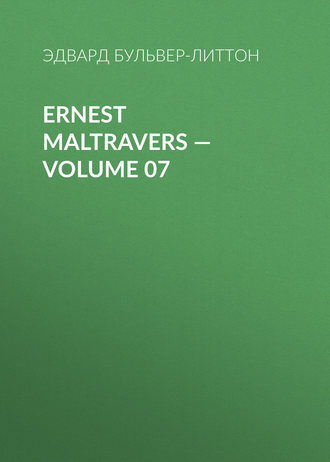
Эдвард Бульвер-Литтон
Ernest Maltravers — Volume 07
"No," said Mrs. Templeton, with a very slight colour in her delicate cheek, "I learned young, and of one who loved music and felt it; but who was not a foreigner."
"Will you sing me that song again?—you give the words a beauty I never discovered in them; yet they (as well as the music itself), are by my poor friend whom Mr. Templeton does not like—Maltravers."
"Are they his also?" said Mrs. Templeton, with emotion; "it is strange I did not know it. I heard the air in the streets, and it struck me much. I inquired the name of the song and bought it—it is very strange!"
"What is strange?"
"That there is a kind of language in your friend's music and poetry which comes home to me, like words I have heard years ago! Is he young, this Mr. Maltravers?"
"Yes, he is still young."
"And, and—"
Here Mrs. Templeton was interrupted by the entrance of her husband. He held the letter from Lord Saxingham—it was yet unopened. He seemed moody; but that was common with him. He coldly shook hands with Lumley; nodded to his wife, found fault with the fire, and throwing himself into his easy-chair, said, "So, Lumley, I think I was a fool for taking your advice—and hanging back about this new election. I see by the evening papers that there is shortly to be a creation of peers. If I had shown activity on behalf of the government I might have shamed them into gratitude."
"I think I was right, sir," replied Lumley; "public men are often alarmed into gratitude, seldom shamed into it. Firm votes, like old friends, are most valued when we think we are about to lose them; but what is that letter in your hand?"
"Oh, some begging petition, I suppose."
"Pardon me—it has an official look." Templeton put on his spectacles, raised the letter, examined the address and seal, hastily opened it, and broke into an exclamation very like an oath: when he had concluded—" Give me your hand, nephew—the thing is settled—I am to have the peerage. You were right—ha, ha!—my dear wife, you will be my lady, think of that—aren't you glad?—why don't your ladyship smile? Where's the child—where is she, I say?"
"Gone to bed, sir," said Mrs. Templeton, half frightened.
"Gone to bed! I must go and kiss her. Gone to bed, has she? Light that candle, Lumley." [Here Mr. Templeton rang the bell.] "John," said he, as the servant entered,—"John, tell James to go the first thing in the morning to Baxter's, and tell him not to paint my chariot till he hears from me. I must go kiss the child—I must, really."
"D—- the child," muttered Lumley, as, after giving the candle to his uncle, he turned to the fire; "what the deuce has she got to do with the matter? Charming little girl—yours, madam! how I love her! My uncle dotes on her—no wonder!"
"He is, indeed, very, very, fond of her," said Mrs. Templeton, with a sigh that seemed to come from the depth of her heart.
"Did he take a fancy to her before you were married?"
"Yes, I believe—oh yes, certainly."
"Her own father could not be more fond of her."
Mrs. Templeton made no answer, but lighted her candle, and wishing Lumley good night, glided from the room.
"I wonder if my grave aunt and my grave uncle took a bite at the apple before they bought the right of the tree. It looks suspicious; yet no, it can't be; there is nothing of the seducer or the seductive about the old fellow. It is not likely—here he comes."
In came Templeton, and his eyes were moist, and his brow relaxed.
"And how is the little angel, sir?" asked Ferrers.
"She kissed me, though I woke her up; children are usually cross when wakened."
"Are they?—little dears! Well, sir, so I was right, then; may I see the letter?"
"There it is."
Ferrers drew his chair to the fire, and read his own production with all the satisfaction of an anonymous author.
"How kind!—how considerate!—how delicately put!—a double favour! But perhaps, after all, it does not express your wishes."
"In what way?"
"Why—why—about myself."
"/You!/—is there anything about /you/ in it?—I did not observe /that/—let me see."
"Uncles never selfish!—mem. for commonplace book!" thought Ferrers.
The uncle knit his brows as he re-perused the letter. This won't do, Lumley," said he very shortly, when he had done.
"A seat in parliament is too much honour for a poor nephew, then, sir?" said Lumley, very bitterly, though he did not feel at all bitter; but it was the proper tone. "I have done all in my power to advance your ambition, and you will not even lend a hand to forward me one step in my career. But, forgive me, sir, I have no right to expect it."
"Lumley," replied Templeton, kindly, "you mistake me. I think much more highly of you than I did—much: there is a steadiness, a sobriety about you most praiseworthy, and you shall go into parliament if you wish it; but not for C———. I will give my interest there to some other friend of the government, and in return they can give you a treasury borough! That is the same thing to you."
Lumley was agreeably surprised—he pressed his uncle's hand warmly, and thanked him cordially. Mr. Templeton proceeded to explain to him that it was inconvenient and expensive sitting for places where one's family was known, and Lumley fully subscribed to all.
"As for the settlement of the peerage, that is all right," said Templeton; and then he sank into a reverie, from which he broke joyously—"yes, that is all right. I have projects, objects—this may unite them all—nothing can be better—you will be the next lord—what—I say, what title shall we have?"
"Oh, take a sounding one—yon have very little landed property, I think?"
"Two thousand a year in ———shire, bought a bargain."
"What's the name of the place?"
"Grubley."
"Lord Grubley!—Baron Grubley of Grubley—oh, atrocious! Who had the place before you?"
"Bought it of Mr. Sheepshanks—very old family."
"But surely some old Norman once had the place?"
"Norman, yes! Henry the Second gave it to his barber—Bertram Courval."
"That's it!—that's it! Lord de Courval—singular coincidence!—descent from the old line. Herald's College soon settle all that. Lord de Courval!—nothing can sound better. There must be a village or hamlet still called Courval about the property."
"I am afraid not. There is Coddle End!"
"Coddle End!—Coddle End!—the very thing, sir—the very thing—clear corruption from Courval!—Lord de Courval of Courval! Superb! Ha! ha!"
"Ha! ha!" laughed Templeton, and he had hardly laughed before since he was thirty.
The relations sat long and conversed familiarly. Ferrers slept at the villa, and his sleep was sound; for he thought little of plans once formed and half executed; it was the hunt that kept him awake, and he slept like a hound when the prey was down. Not so Templeton, who did not close his eyes all night.—"Yes, yes," thought he, "I must get the fortune and the title in one line by a prudent management. Ferrers deserves what I mean to do for him. Steady, good-natured, frank, and will get on—yes, yes, I see it all. Meanwhile I did well to prevent his standing for C———; might pick up gossip about Mrs. T., and other things that might be unpleasant. Ah, I'm a shrewd fellow!"
CHAPTER III
"/Lauzun./—There, Marquis, there, I've done it.
/Montespan./—Done it! yes! Nice doings!"
/The Duchess de la Valliere/.
LUMLEY hastened to strike while the iron was hot. The next morning he went straight to the Treasury—saw the managing secretary, a clever, sharp man, who, like Ferrers, carried off intrigue and manoeuvre by a blunt, careless, bluff manner.
Ferrers announced that he was to stand for the free, respectable, open city of C———, with an electoral population of 2,500. A very showy place it was for a member in the old ante-reform times, and was considered a thoroughly independent borough. The secretary congratulated and complimented him.
"We have had losses lately in /our/ elections among the larger constituencies," said Lumley.
"We have indeed—three towns lost in the last six months. Members do die so very unseasonably."
"Is Lord Staunch yet provided for?" asked Lumley. Now Lord Staunch was one of the popular show-fight great guns of the administration—not in office, but that most useful person to all governments, an out-and-out supporter upon the most independent principles—who was known to have refused place and to value himself on independence—a man who helped the government over the stile when it was seized with a temporary lameness, and who carried "great weight with him in the country." Lord Staunch had foolishly thrown up a close borough in order to contest a large city, and had failed in the attempt. His failure was everywhere cited as a proof of the growing unpopularity of ministers.
"Is Lord Staunch yet provided for?" asked Lumley.
"Why, he must have his old seat—Three-Oaks. Three-Oaks is a nice, quiet little place; most respectable constituency—all Staunch's own family."
"Just the thing for him; yet, 'tis a pity that he did not wait to stand for C———; my uncle's interest would have secured him."
"Ay, I thought so the moment C——— was vacant. However, it is too late now."
"It would be a great triumph if Lord Staunch could show that a large constituency volunteered to elect him without expense."
"Without expense!—Ah, yes, indeed! It would prove that purity of election still exists—that British institutions are still upheld."
"It might be done, Mr. ———."
"Why, I thought that you—"
"Were to stand—that is true—and it will be difficult to manage my uncle; but he loves me much—you know I am his heir—I believe I could do it; that is, if you think it would be /a very great advantage/ to the party, and /a very great service/ to the government."
"Why, Mr. Ferrers, it would indeed be both."
"And in that case I could have Three-Oaks."
"I see—exactly so; but to give up so respectable a seat—really it is a sacrifice."
"Say no more, it shall be done. A deputation shall wait on Lord Staunch directly. I will see my uncle, and a despatch shall be sent down to C——— to-night; at least, I hope so. I must not be too confident. My uncle is an old man, nobody but myself can manage him; I'll go this instant."
"You may be sure your kindness will be duly appreciated."
Lumley shook hands cordially with the secretary and retired. The secretary was not "humbugged," nor did Lumley expect he should be. But the secretary noted this of Lumley Ferrers (and that gentleman's object was gained), that Lumley Ferrers was a man who looked out for office, and if he did tolerably well in parliament, that Lumley Ferrers was a man who ought to be /pushed/.
Very shortly afterwards the /Gazette/ announced the election of Lord Staunch for C———, after a sharp but decisive contest. The ministerial journals rang with exulting paeans; the opposition ones called the electors of C——— all manner of hard names, and declared that Mr. Stout, Lord Staunch's opponent, would petition—which he never did. In the midst of the hubbub, Mr. Lumley Ferrers quietly and unobservedly crept into the representation of Three-Oaks.
On the night of his election he went to Lord Saxingham's; but what there happened deserves another chapter.







